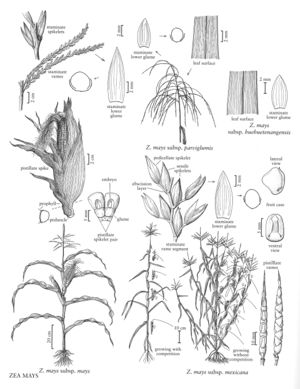familyPoaceae
subfamilyPoaceae subfam. Panicoideae
genusZea
speciesZea mays
subspeciesZea mays subsp. huehuetenangensis
Difference between revisions of "Zea mays subsp. huehuetenangensis"
Common names: Huehuetenango teosinte
Treatment appears in FNA Volume 25. Treatment on page 701.
FNA>Volume Importer |
FNA>Volume Importer |
||
| Line 13: | Line 13: | ||
}}<!-- | }}<!-- | ||
| − | --><span class="statement" id="st-undefined" data-properties=""><b>Zea </b>mays <i></i>subsp.<i> huehuetenangensis</i> is morphologically similar to <i></i>subsp.<i> parviglumis</i> (see below), but it often grows more than 5 m tall, and has essentially glabrous leaves, and smaller staminate panicles with fewer (less than 40), firmer branches, and different ecological, phenological, and molecular characteristics.</span><!-- | + | --><span class="statement" id="st-undefined" data-properties=""><b>Zea </b>mays <i></i></i>subsp.<i><i> huehuetenangensis</i> is morphologically similar to <i></i></i>subsp.<i><i> parviglumis</i> (see below), but it often grows more than 5 m tall, and has essentially glabrous leaves, and smaller staminate panicles with fewer (less than 40), firmer branches, and different ecological, phenological, and molecular characteristics.</span><!-- |
-->{{Treatment/Body | -->{{Treatment/Body | ||
| Line 36: | Line 36: | ||
|publication year= | |publication year= | ||
|special status= | |special status= | ||
| − | |source xml=https://jpend@bitbucket.org/aafc-mbb/fna-data-curation.git/src/ | + | |source xml=https://jpend@bitbucket.org/aafc-mbb/fna-data-curation.git/src/f6b125a955440c0872999024f038d74684f65921/coarse_grained_fna_xml/V25/V25_1665.xml |
|subfamily=Poaceae subfam. Panicoideae | |subfamily=Poaceae subfam. Panicoideae | ||
|tribe=Poaceae tribe Andropogoneae | |tribe=Poaceae tribe Andropogoneae | ||
Revision as of 20:24, 24 September 2019
Zea mays subsp. huehuetenangensis is morphologically similar to subsp. parviglumis (see below), but it often grows more than 5 m tall, and has essentially glabrous leaves, and smaller staminate panicles with fewer (less than 40), firmer branches, and different ecological, phenological, and molecular characteristics.
Discussion
It is endemic to the Province of Huehuetenango, Guatemala, where it grows as a common weed on the edges of, and in, maize fields, and in seasonally moist oak cloud and tropical deciduous forests, at elevations from 900-1650 m. In its native range, it commonly hybridizes with Z. mays subsp. mays, both subspecies flowering from mid-December to mid-January, at the end of the wet season.
Selected References
None.
Lower Taxa
None.
... more about "Zea mays subsp. huehuetenangensis"
Huehuetenango teosinte +
Ga. +, Va. +, Conn. +, R.I. +, Calif. +, Idaho +, Oreg. +, Wash. +, Ala. +, Ark. +, Colo. +, Iowa +, Ill. +, Ind. +, Kans. +, Ky. +, La. +, Mass. +, Md. +, Maine +, Mich. +, Minn. +, Mo. +, Miss. +, Mont. +, N.C. +, N.H. +, N.J. +, N.Mex. +, N.Y. +, Ohio +, Pa. +, Puerto Rico +, S.C. +, Tenn. +, Tex. +, Utah +, Virgin Islands +, Vt. +, Wis. +, W.Va. +, Wyo. +, Ont. +, Que. +, Fla. +, Nebr. +, Ariz. + and Nev. +
Present +
Zea mays subsp. huehuetenangensis +
Zea mays +
subspecies +
